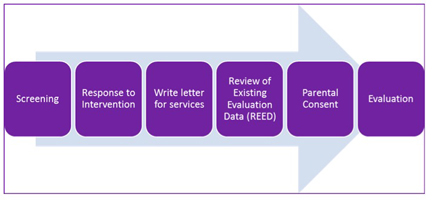If you have already requested a special education evaluation in writing, the school district CANNOT delay an individual evaluation because interventions have not been implemented. RtI is NOT required to occur before a referral is made/evaluation is started.
What happens before a referral for evaluation?
Prior to referral, students experiencing difficulties in the general education classroom can be considered for all support services available to all students.
Under IDEA, at risk students can receive supports based on the Response to Intervention (RtI) model before a referral to special education is made. Collaboration with teachers is key to ensure your child gets the most out the intervention provided.
With RtI, schools would ensure:
- Students receive high quality instruction (teaching strategies backed up by research and practice to produce high learning rates for most students),
- Students receive interventions matched to their needs (Interventions such as tutorial, remedial, compensatory or other services)
- Students are monitored frequently on progress to make academic or behavior decisions that are results based;
- The RTI model provides data-based school improvement; and
- Data on student response are applied to important educational decisions (such as those regarding placement, intervention, curriculum, and instructional goals and methodologies).
***New (SB 1153): Schools must notify the parents each year if the child is receiving assistance for learning difficulties. (This does not apply to students receiving special education services.) The notice must be provided when the child begins to receive the assistance for that year and include:
- a description of the assistance provided, including intervention strategies and
- how long the assistance will be provided.
The notice must be:
- in writing and
- in the parent’s native language to the extent practicable.
But what if RtI does not help your child? Then talk with your child’s teacher about your concerns. If you and/or the teacher think your child may have a disability then you can consider requesting a Full and Individual Initial evaluation (FIE). A request for a FIE should be made if/when any of the following conditions are met:
- Difficulties continue after support and intervention services are provided;
- Data that is collected shows the student needs more individualized interventions; or
- You or someone else thinks your child has a disability AND needs special education or related services to benefit from his or her education.
Be advised, you do not have to wait for RtI interventions to refer your child for an evaluation.
The RTI process cannot be used to delay or keep your child from having a Full and Individual Initial Evaluation (FIE).
If the school decides not to evaluate:
If the school decides not to evaluate, the school must inform you in writing of the school’s refusal. This is called prior written notice. Parents must also be informed in writing when/if the school:
- decides to do a screening, or
- proposes to provide more intensive instruction instead of an evaluation.
If the school decides not to evaluate your child and you do not agree with that decision, you have due process rights. Filing a complaint with the Texas Education Agency (TEA) or requesting mediation are some of those rights. For information on your options, please see “Dispute Resolution”.
What parents need to remember
RtI is for students experiencing difficulties in the general classroom and can be considered before a referral to special education is made.
Partner with the school to ensure that the interventions your child is receiving are working. If they’re not, collaborate with the school to come up with alternate interventions or request a formal evaluation.
ADDITIONAL RESOURCES:
Center for Response to Intervention – Family Resources, including Parent FAQs
Office of Special Education Programs (OSEP) – Letter to Administrators: 2011 RtI cannot be used to delay or deny evaluation
Office of Special Education & Rehabilitation Services (OSERS) – Letter on Response to Intervention
TEA – Response to Intervention Guidance and Early Intervening Services
Texas Assistive Technology Network – Response to Intervention
Understood.org – A Parent’s Guide to Response to Intervention
University of Texas/Meadows Center for Preventing Educational Risk – Parent Resources
Articles from GreatSchools.org:
- Response-To-Intervention: An Emerging Method for LD Identification http://www.greatschools.org/gk/articles/emerging-method-for-ld-identification/
- Before Special Ed: How Pre-referral Works http://www.greatschools.org/gk/articles/pre-referral/





